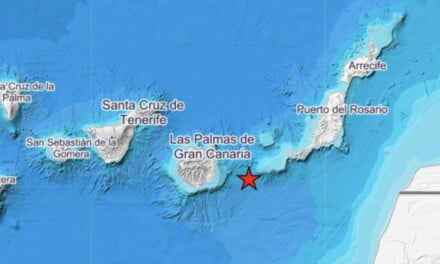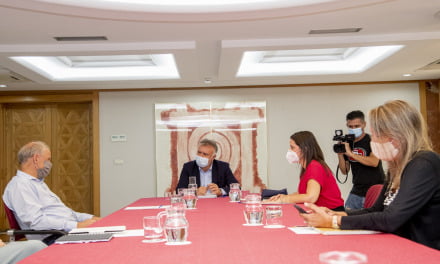.:. Edward Timon .:. The Canary – Feature Image: View For Sale – 45photos.com Bård Ove Myhr
The Canary Islands have this Thursday announced that they will no longer require, from as early as next week, a PCR or an antigen test from domestic travellers, and international transit passengers, who arrive on the islands, so long as they have previously been vaccinated against COVID-19 or have recently recovered from the disease. The changes look set to align with measures already taken in Spain, and expected within the EU to come into force on June 7.
Regional Government spokesman for the Canarian Executive, Julio Pérez, indicated in a press conference that the Ministry of Health will be issuing an order detailing the conditions that travellers must meet to certify they have received vaccinations or have recently recovered from COVID-19. The new rules look set to supersede the previous legislation, which currently requires a negative PCR for all travellers headed for the Archipelago from elsewhere in Spain. Pérez stressed that the goal is for the new rules to take effect on Monday and that they will also apply to international transit passengers who are passing through the archipelago.
It is not yet clear, however, if these rules will form the basis for allowing international holiday travel, particularly from non-EU “third countries” without the need to present negative test results, in line with the Spanish Prime Ministers announcements last Friday.
Thursday’s weekly Governing Council meeting took a look the new Canarian regulations for travellers coming to the Islands carrying health guarantees against COVID-19. What will be a new rule, to be published in the BOC, Canary Islands Official Gazette, as an order of the Health Minister next week, will establish that it will not be necessary for people to present active infection diagnostic test (Pruebas Diagnósticas De Infección Activa or PDIA) results for SARS-CoV-2, when entering the Canary Islands from the rest of the national Spanish territories, so long as they have official documentation proving that they have received the complete vaccination schedule against COVID-19 or at least one dose of an authorised vaccine more than 15 days prior to the date of their trip.
The legal measure is set to primarily modify provisions in force since April 10, which established the need to carry out screening of travellers, using PDIA, who enter Canary Islands territory from the mainland, or from other Spanish territories, by air or sea, to contain the spread of infections caused by SARS-CoV-2, as well as detailing various exclusions to the rules.
This modification will say that it is no longer necessary to present COVID-19 detection test results, given that the evidence points to “from the first inoculation, the vaccine having relevant effects in reducing the possibility of contagion by the vaccinated person” just as having recovered from the disease can do, “which makes it possible to exempt these groups from carrying out the diagnostic tests control”.
On that basis, when the order is published, all travellers who have received at least one dose, or who have recovered from covid-19, will be excluded from having to present negative test results upon entry to the Canary Islands.
Interestingly, passengers in transit through a Canarian port or airport are to be included in the order, meaning anyone whose final destination is another country or another place in Spain, including anyone that can prove that they have been outside the Autonomous Community of the Canary Islands in the 72 hours prior to arrival, regardless of their place of residence, will also be excluded from having to present a negative result, so long as they meet the criteria set out.
Those who have an official document proving that they have received the complete vaccination schedule within the eight months prior to their journey, or, failing that, have had at least one dose of a vaccine authorised by the European Medicines Agency (EMA) against COVID-19 (in this second case more than 15 days prior to the journey) within the previous four months, or that prove with an official medical certificate or public document that they have had the illness within the last six months or less, and recovered, will all be exempted from the need to show a negative test result.
As for international travellers, Julio Perez indicated that it is for the central Government to decide and specified that President Pedro Sánchez has announced the change in requirements, which will be adopted on the fly by the Canary Islands.
Although this legislation is aimed primarily at domestic travel, and international transit, and it has not yet been explicitly stated, it is our understanding at The Canary News, this new Health Ministry order could subsequently function as the key framework to exempt international travellers from being required to present test results when checking in to registered tourism accommodations. That requirement, for the moment, remains in force.
One of the legislative quirks that has recently arisen for The Canary Islands, is centred around the regional tourism legislation published last October 29, in an attempt to improve our ability to receive tourists. Decree Law 17/2020, on extraordinary measures in tourism to deal with the effects of the health and economic crisis produced by the pandemic caused by COVID-19 was devised last autumn by the Regional Executive, in the absence of any provision for testing on arrival to Spanish airports. The innovative piece of regional tourism law contained a sole article setting forward the conditions of access to tourist accommodation establishments in the Canary Islands during the COVID-19 pandemic, and made it mandatory for holidaymakers, staying in registered tourism accommodation to present a negative test result at check-in to their hotel, apartment or holiday home.
This would have brilliantly provided a framework, where none had existed nationally nor within the European Union, through which Canary Islands tourism could restart had air travel from various source countries not been subsequently either restricted or shut down all together as a third wave of the pandemic swept across Europe, negating any possibility of receiving tourists over the winter holiday season.
However, now that Spain has announced their new rules for entry through airports from third countries, outside of the EU, with its own safe-list of origin countries that do not require a test on arrival, a confusing disparity has emerged between regional and national law, which would currently mean that most tourists arriving from the UK, for instance, would still, according to current regional legislation, need to present a negative test result at their hotel reception (or apartment or holiday home) before being allowed to check in, even though they would no longer need one to arrive at any Spanish airport.
If this is the case, then The Canary Islands would become realigned once again with Spanish rules on territorial entry. The only remaining obstacle at that point, particularly for the main summer tourism source market, would be for countries like the UK to change their travel advice regarding regions like The Canary Islands, with some of the lowest infection rates in all Europe, to allow unfettered travel without the need to test or quarantine on return. This would require the British Government to include The Canary Islands on their so-called Green List of countries that are safe to visit. The islands are currently on the Amber List, along with the rest of Spain, which still requires tests and mandatory quarantine on return to the UK. While there are murmurings of this being likely to happen by June 7, nothing has yet been formally announced there either.
For now, everything appears to be moving in the right direction, with protocols being brought into alignment to allow for easier travel within Spain, and to The Canary Islands, that, over time, should help to ensure a full re-opening, sooner rather than later, of safe travel between the UK and The Canary Islands within the foreseeable future, just not quite yet.
So long as the frameworks are being put together, and the epidemiological data remains favourable, it looks like The Canary Islands are in for a great summer ahead. Lost knows we need it.
Exclusion cases
Points 2 and 3 of the fourth section of the Order of April 10 remain in force in their entirety, so the presentation of negative PDIA is not required at the time of entry to the Canary Islands from people who prove a reservation in an tourist accommodation establishment registered in the General Tourist Registry of the Autonomous Community of the Canary Islands which are thereby subject to the public health control regime in the admission to a lodging establishment according to Decree Law 17/2020, of October 29, on extraordinary tourism measures to face the effects of the health and economic crisis produced by the pandemic caused by COVID-19.
Isolation of passengers who have not completed their Diagnostics Test within the 72 hours prior to arrival will be excused when the urgency of the journey prevents it, such as in the following cases:
a) Employed or self-employed workers who carry out critical occupations, including health workers, on professional posting.
b) Workers or transport service providers, including freight vehicle drivers, who transport goods for use within the territory.
c) Patients travelling for imperative medical reasons.
d) Assistance or care, for imperative reasons, to seniors, minors, dependents, people with disabilities or especially vulnerable people.
e) Public representatives, diplomats, personnel of international organisations and the persons invited by them whose physical presence is necessary for the proper functioning of said organisations, the military and police, humanitarian workers and civil protection personnel, in the exercise of their functions.
f) Seafarers who arrive in the Canary Islands back from their campaign on board a ship or in transit to embark or disembark.
g) The crew of ships and aircraft that carry out passenger or merchandise traffic between the Canary Islands and other Autonomous Communities or countries.
h) Journalists in their professional displacement.












